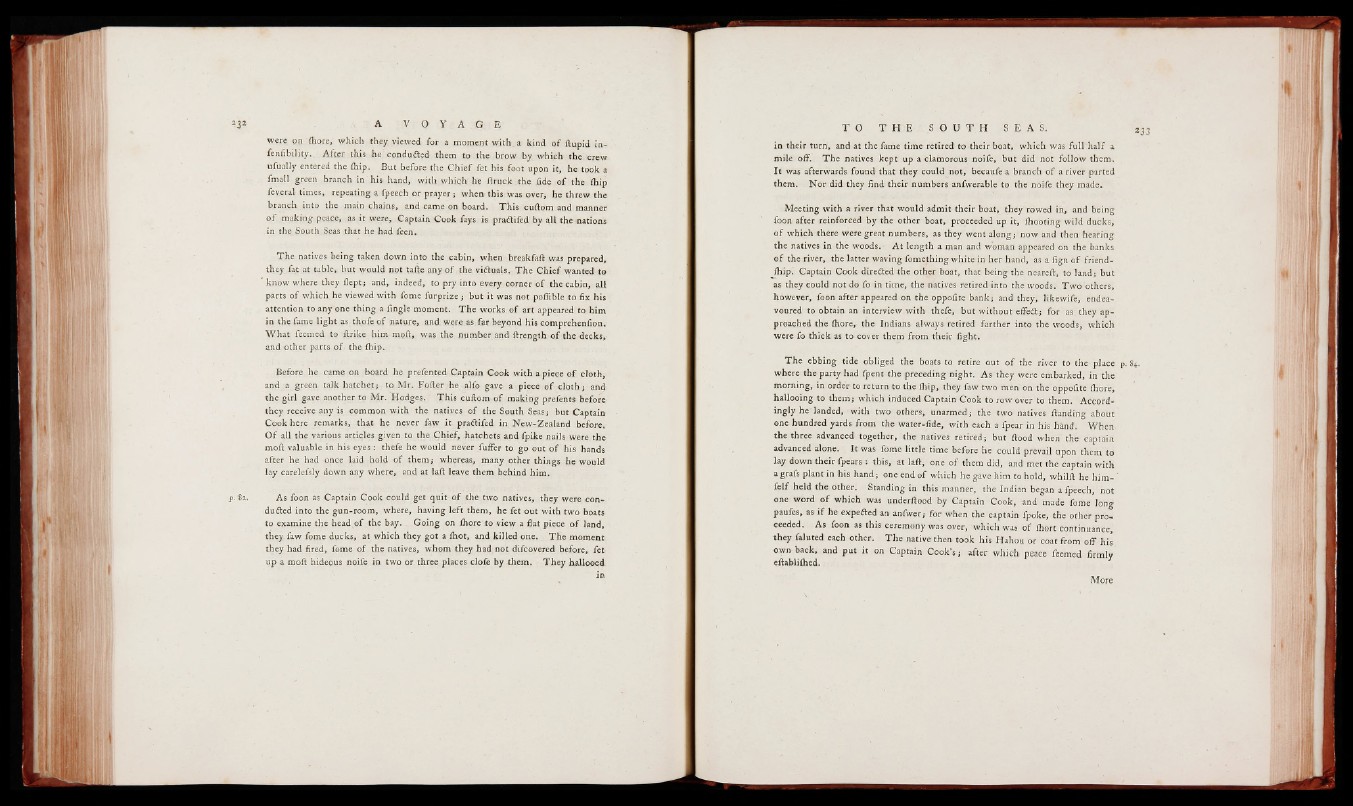
were on ihore, which they viewed for a moment with a kind of ftupid in-
fenfibility. After this he: conduced them to the brow by, which the crew
ufually entered the ihip. But before the Chief fet his foot upon it, he took a
fmall green branch in his hand, with which he ftruck the fide of the ihip
feveral times, repeating a fpeech or prayer; when this was over, he threw the
branch into the main chains, and came on board* This cuftom and manner
o f making peace, as it were, Captain Cook fays is praftifed by all the nations
in the_South Seas that he had feen.
The natives being taken down into the cabin, when breakfaft was prepared,
they fat at table, but would not tafte any of the victuals. The Chief wanted to
'know where they flept; and, indeed, to pry into every corner of the cabin, all
parts of which he viewed with fome furprize; but it was not poffible to fix his
attention to any one thing a fingle moment. The works of art appeared to him
in the fame light as thpfe of nature, and were as far beyond his comprehenfion.
What feemed to ftrike him molt, was the number and ftrength of the decks,'
and other parts of the ihip.
Before he came on board he prefented Captain Cook with a piece of cloth,
and a green talk hatchet; to Mr. Fofter he alfo gave a piece of cloth; and
the girl gave another to Mr. Hodges. This cuftom of making prefents before
they receive any is common with the natives of the South Seas; but Captain
Cook here remarks, that he never faw it pradtifed in New-Zealand before.
O f all the various articles given to the Chief, hatchets and lpike nails were the
moll valuable in his eyes : thefe he would never .fuffer to go out of his hands
after he had once laid hold of them; whereas, many other things he would
lay carelefsly down any where, and at lafl leave them behind him.
p. 82. As foon as Captain Cook could get quit of the two natives, they were conduced
into the gun-room, where, having left them, he fet out with two boats
to examine the head of the bay. Going on ihore to view a flat piece of land,
they faw fome ducks, at which they got a ihot, and killed one. The moment
they had fired, fome of the natives, whom they had not difcovered before, fet
up a moil hideous noiie in two or three places clofe by them. They hallooed
in
in their turn, and at the fame time retired to their boat, which was full half a
mile off. The natives kept up a clamorous noife, but did not follow them.
It was afterwards found that they could not, becaufe a branch of a river parted
them. Nor did they find their numbers anfwerable to the noife they made.
Meeting with a river that would admit their boat, they rowed in, and being
foon after reinforced by the other boat, proceeded up it, ihooting wild ducks,
of which there were great numbers, as they went along; now and then hearing
the natives in the woods. At length a man and woman appeared on the banks
of the river, the latter waving fomething white in her hand, as a fign of friend-
ihip. Captain Cook directed the other boat, that being the neareft, to land; but
as they could not do fo in time, the natives retired into the wòods. Two others,
however, foon after appeared on the oppofite bank; and they, likewife, endeavoured
to obtain an interview with thefe, but without effeét; for as they approached
the ihore,- the Indians always retired farther into the woods, which
were fo thick as to cover them from their fight.
The ebbing tide obliged the boats to retire out of the ri vèr to the place p. 84.
where the party had fpent the preceding night. As they were embarked, in the
morning, in order to return to the ihip, they faw two men on the oppofite ihore,
hallooing to them; which induced Captain Cook to row over to them. Accord-
ingly he landed, with two others, unarmed; the two natives flanding about
one hundred yards from the water-fide, with each a fpear in his hand. When
the three advanced together, the natives retired; but flood when the captain
advanced alone. It was fome little time before he could prevail upon them to
lay down their fpears ; this, at lafl, one of them did, and met the captain with
agrafs plant in his hand; one end of which he gave him to hold, whilft he him-
felf held the other. Standing in this manner, the Indian began a fpeech, not
one word of which was underflood by Captain Cook, and made fome long
paufes, as i f he expeéled an anfwer; for when the captain fpoke, the other proceeded.
As foon as this ceremony was over, which was of ihort continuance,
they faluted each other. The native then took his Hahou or coat from off his
own back, and put it on Captain Cook’s ; after which peace feemed firmlv
eftabliihed.
More